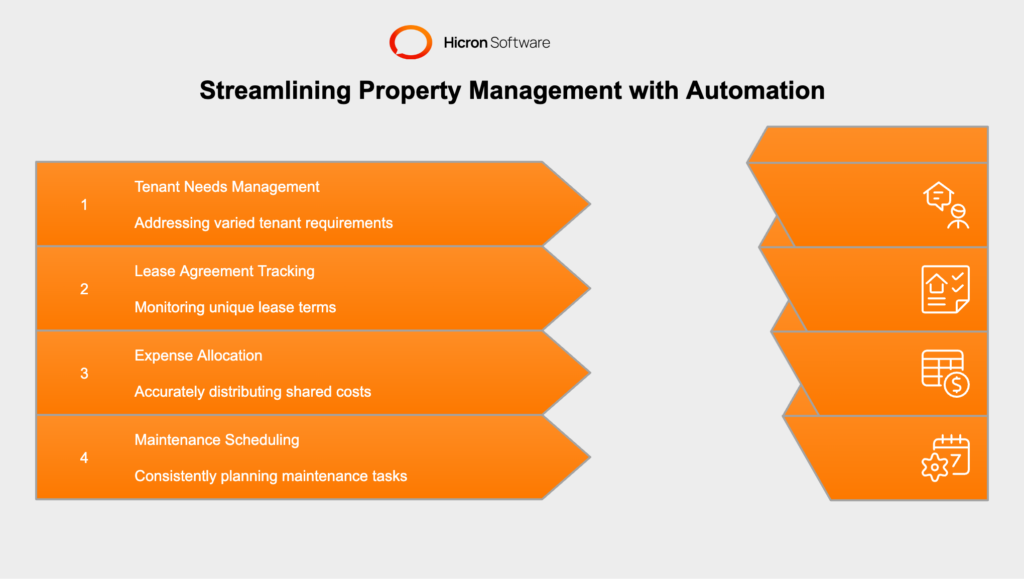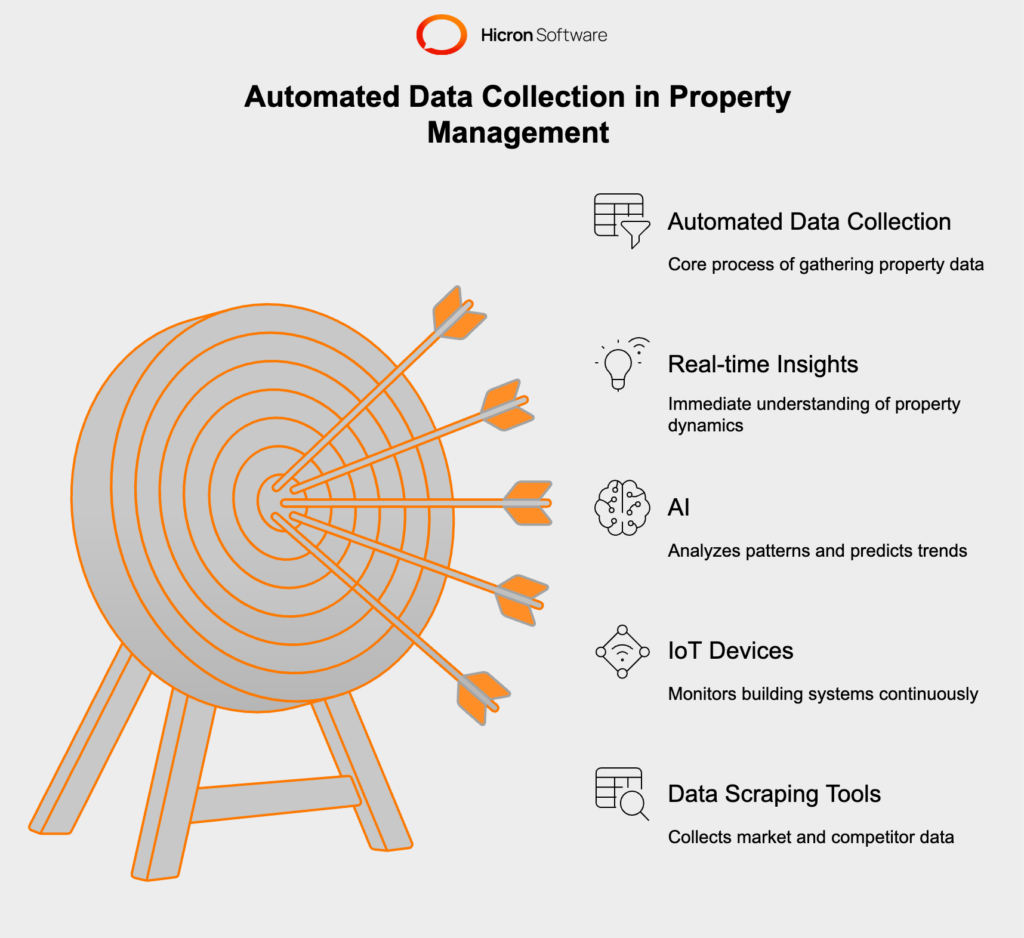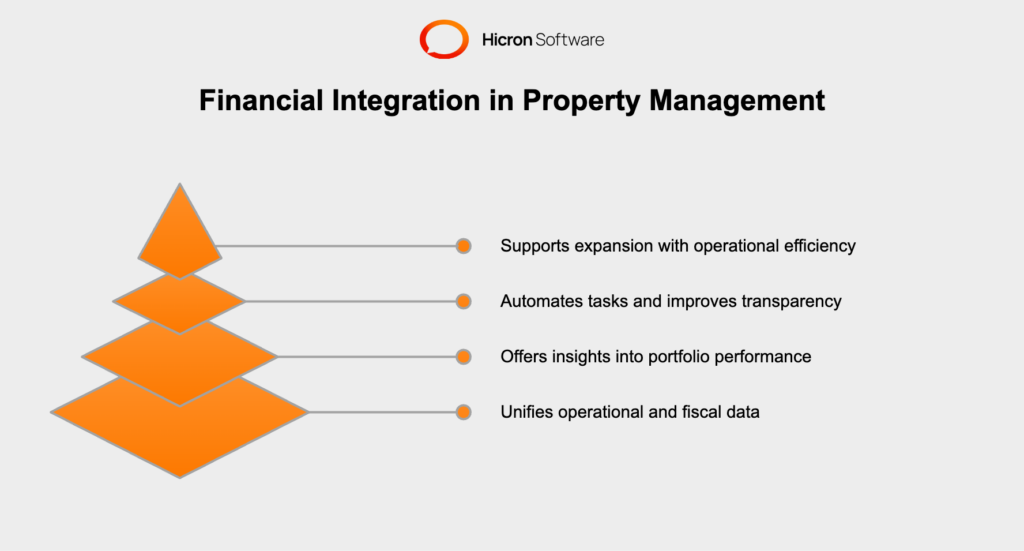10 Real Estate Software Development Companies in 2025
- February 03
- 9 min

Managing large-scale property portfolios presents unique and complex challenges, from overseeing diverse tenant needs to ensuring operational efficiency across multiple sites. Traditional management methods often fall short, leaving property managers overwhelmed by manual processes and scattered data.
This is where innovative solutions like automated data collection and PropTech step in to redefine the approach.
Automated data collection in large-scale property management uses advanced technologies like AI, IoT, and software platforms to gather, process, and analyze property-related data without manual input. This approach provides real-time insights into tenant behavior, maintenance needs, and financial metrics, enabling property managers to streamline operations and make informed decisions efficiently.
By delivering more efficient operations, enhanced scalability, and data-driven insights, these technologies are reshaping the property management landscape. Drawing from expertise within the real estate industry, this article explores how these advancements are enabling property managers to overcome hurdles and drive smarter decision-making.
Managing a large-scale property portfolio is no simple task. The challenges range from juggling diverse property types: residential complexes, office spaces, and retail centers to addressing tenant needs that vary by location and agreement. These complexities only grow as portfolios expand across cities or regions, requiring sophisticated systems to maintain order and efficiency.
Scalability has become a critical factor in navigating these challenges. Property portfolios must be equipped to handle ongoing growth, fluctuating demands, and the intricacies of managing various assets without sacrificing operational efficiency.
For instance, managing a shopping mall with dozens of tenants involves tracking unique lease agreements, accurately allocating shared expenses, and consistently monitoring maintenance schedules.
Similarly, mixed-use developments require oversight of not just multiple tenants but also a variety of property types, each governed by different rules and responsibilities. Without scalable solutions, the administrative burden can overwhelm even the most experienced property management teams.

This is where PropTech provides an advantage. By centralizing operations onto a single digital platform, PropTech solutions eliminate the inefficiencies of disjointed systems and streamline property management tasks. Tailored proptech platforms bring different operational elements together, from lease tracking and maintenance scheduling to financial reporting and tenant communication. For large-scale property managers, this means they can oversee an entire portfolio with clarity and control, reducing the time spent on manual processes.
Take, for example, a retail shopping center. With a centralized PropTech platform, all tenant agreements, financial records, and maintenance requests can be integrated into one system. Managers can quickly access critical information, such as upcoming lease renewals or overdue rent payments, without navigating multiple databases or spreadsheets. These platforms also enable real-time updates, ensuring that property managers always work with the most accurate data, further enhancing their ability to make informed decisions.
Scalability is about preparing for what’s to come. With the help of PropTech, property managers can confidently take on portfolio growth, extend their operations to new locations, and tackle the changing demands of diverse tenant groups without compromising efficiency. The ability to adapt and organize at scale makes these solutions an essential part of modern property management.
Automated data collection is the process of using advanced technologies to gather, process, and analyze property-related information, eliminating the need for manual input.
Within property management, it plays a crucial role in providing real-time insights into tenant behavior, maintenance requirements, and financial metrics. This process relies on innovations such as:
By leveraging these technologies, property managers can streamline operations and optimize portfolio performance.
What kind of property data are we talking about?
By using these tools, property managers gain access to accurate, up-to-date data that enables smarter, faster decision-making.

PropTech’s potential is fully realized when financial systems are integrated into the property management process. Real estate organizations need robust financial frameworks to unify operational and fiscal data.
Integrating financial systems with PropTech is essential for managing large-scale property portfolios. This approach offers real-time visibility into revenues, expenses, and overall portfolio performance, allowing property managers to
Centralized platforms with customized dashboards help managers quickly identify trends such as rising costs or overdue payments and take timely action to optimize profitability.
Financial integration streamlines daily operations and improves transparency with tenants, strengthening trust and simplifying processes. Tasks like
are automated, ensuring accuracy and compliance while reducing administrative workloads.By building a unified financial foundation, property managers can support portfolio growth while maintaining operational efficiency.
For instance, a large shopping mall with dozens of tenants can rely on PropTech to track rent collection and allocate common area maintenance expenses transparently and efficiently. This alignment between financial systems and property management tools reduces the risk of errors and fosters trust with tenants.

A single large-scale property can have dozens or even hundreds of tenants. Each comes with unique agreements, billing needs, and service expectations.
|
Process |
Automation Benefits |
Impact on Property Management |
|
Rent Collection |
Automated invoicing, payment tracking, reminders, secure online payments |
Ensures consistent revenue flow, reduces manual work, increases tenant convenience |
|
Utility Billing |
Smart metering, automatic bill generation, itemized statements |
Increases billing accuracy, eliminates disputes, allows real-time monitoring |
|
Shared Expense Allocation |
Automatic calculation and allocation based on usage or criteria |
Provides fair cost distribution, reduces errors, minimizes potential conflicts |
|
Financial Transparency |
Tenant access to detailed records, real-time updates |
Fosters trust, improves tenant satisfaction and retention |
|
Revenue Management |
Streamlined processes, accurate data, timely payment processing |
Supports steady cash flow, saves administrative time, enhances portfolio growth |
PropTech platforms automate many of these challenges by streamlining processes such as rent collection, utility billing, and shared expense allocations.
Automated notifications and online tenant portals improve communication between property managers and tenants, creating transparency and convenience.
This smooth operational flow benefits the workforce. It enhances tenant satisfaction, too. When tenants can easily track payments or request support through integrated systems, they’re more likely to remain loyal and satisfied.
Automated data collection and PropTech depend on modern tools and technologies to enhance property management. These innovations help streamline operations, improve decision-making, and provide actionable insights for property managers. Below is an overview of the essential tools enabling this transformation.
|
Tool/Technology |
Role in Property Management |
Key Benefits |
|
AI-Powered Analytics |
Processes large datasets to reveal trends, predict risks, and recommend actions. |
Informs decision-making, supports resource allocation, and predicts maintenance or payment issues. |
|
IoT Sensors |
Monitors building systems, energy use, and occupancy in real time. |
Enables early fault detection, optimizes energy, and improves tenant comfort. |
|
Real Estate Software Platforms |
Centralizes operations, combining lease tracking, maintenance, and financial reporting. |
Improves efficiency, provides comprehensive oversight, reduces manual tasks. |
|
Machine Learning |
Analyzes historical and real-time data to provide forecasts and automated insights. |
Delivers accurate predictions, optimizes pricing, maintains portfolio profitability. |
|
Integrations (PMS, CRM, Financial Modules) |
Connects property management systems with CRM and finance tools for unified workflows. |
Enhances data accuracy, streamlines communications, and offers real-time financial oversight. |
Artificial intelligence (AI) is at the core of modern property technology. AI-powered analytics processes vast amounts of data to uncover patterns and trends. For instance, AI can analyze rent payment histories to predict which tenants might be at risk of default or identify maintenance issues before they escalate. By delivering actionable insights, AI empowers property managers to allocate resources wisely and make data-driven decisions.
The Internet of Things (IoT) enables real-time monitoring of physical assets and environmental conditions across a property portfolio. IoT sensors can track energy usage, detect equipment failures, or monitor occupancy levels in shared spaces. For example, an IoT-enabled HVAC system can measure temperature and air quality to optimize energy efficiency while notifying property managers of malfunctions. This level of precision reduces costs and enhances tenant satisfaction through better-managed facilities.
Comprehensive real estate software platforms centralize daily operations, uniting tools and data from across various departments. These platforms often come equipped with features for lease tracking, maintenance scheduling, and financial reporting. By bringing these functions together, property managers can avoid the inefficiencies of disconnected systems and gain a complete view of their portfolio.
Machine learning takes automated data collection a step further by interpreting complex datasets and learning from past patterns. For property managers, this means more accurate forecasts and recommendations. For example, machine learning algorithms can analyze years of tenant activity to recommend optimal rental prices or predict seasonal maintenance needs, ensuring portfolios remain profitable and well-maintained.
Modern PropTech solutions often integrate seamlessly with property management systems, customer relationship management (CRM) tools, and financial modules. For example:
These integrations simplify complex operations and ensure that property managers always have access to accurate, up-to-date information. The ability to connect various systems provides a more cohesive and efficient approach to managing properties on a large scale.
From AI-powered analytics and IoT sensors to real estate platforms and machine learning, these tools are transforming how property managers collect and use data. By integrating these technologies with existing systems like CRMs and financial modules, property managers can streamline operations, enhance tenant relationships, and boost portfolio performance. The future of property management lies in leveraging these advanced tools to achieve superior outcomes with greater precision.
The PropTech industry is continuously evolving, and the next wave of innovations promises to amplify its impact further. Artificial intelligence and predictive analytics are paving the way for more sophisticated tools. Imagine AI systems that can:
Sustainability is also becoming a key focus, particularly in the context of reducing energy use and improving building efficiency. PropTech solutions will likely integrate green technologies, allowing property managers to track environmental performance and align their operations with sustainability goals.
Ultimately, these advancements will allow property managers to operate their portfolios with unparalleled precision and agility, ensuring competitiveness in an increasingly dynamic market.
Managing large-scale property portfolios doesn’t have to be an overwhelming challenge. With automated data collection and PropTech, real estate professionals can transform their operations, making them scalable, efficient, and highly profitable. From simplifying tenant management to empowering real-time decision-making, the tools and technologies driving this transformation are enabling the industry to operate smarter.
Now’s the time to explore the future of property management. Are you ready to unlock the potential of your portfolio? Get in touch and start leveraging automated data collection today to stay ahead in this competitive landscape.
Automated data collection uses technologies like AI, IoT, and software platforms to gather, process, and analyze property-related data, eliminating manual input and enabling real-time insights.
PropTech centralizes operations, integrates tasks like lease tracking and financial reporting, and provides real-time updates, making property management more efficient and scalable.
Financial integration automates rent collection, expense allocation, and reporting, providing real-time visibility into portfolio performance and fostering transparency with tenants.
Key tools include AI-powered analytics, IoT sensors for real-time monitoring, machine learning for predictive insights, and real estate software platforms for centralized management.
PropTech automates processes like rent collection, utility billing, and shared expense allocation, improving transparency, trust, and tenant satisfaction while reducing administrative workloads.
